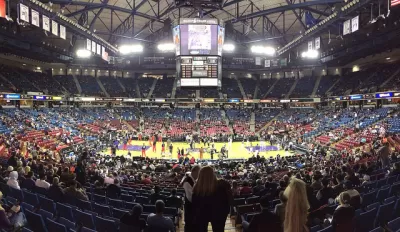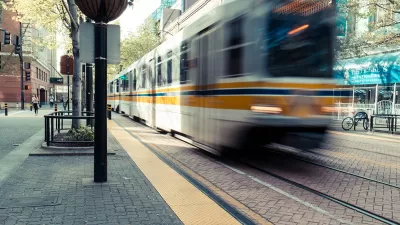Sacramento's parking revenues will pay for the city's share of the arena construction loan.

After years of controversial negotiations, the city of Sacramento has finally completed its share of financing for the $500 million basketball arena that will house the Sacramento Kings. The downtown sports complex will include bars, restaurants, and other retail shops intended to revitalize the neighborhood and draw thousands of new visitors to the area. Financing for the complex comes from both public and private sources.
The $272.9 million bond will be paid off with the city's parking revenues, which are expected to increase. Proposals for increasing parking revenue include a hourly rate increase, more restrictions on the hours of no-cost parking, and event-specific pricing. However, according to Dale Kasler, "officials have said the rate hikes would have taken place regardless of the arena debt."
At 5.67 percent interest, City Treasurer Russ Fehr calculates an annual debt service of $18 million. "The Kings will pay an estimated two-thirds of the debt service through lease payments and property taxes generated by the new arena," writes Kasler. Although the Treasurer says the city got a deal, they could have potentially got the loan at 5 percent back in February but were delayed from proceeding by a citizen's lawsuit, which alleged that the city was providing additional unapproved subsidies to the Kings project.
FULL STORY: Sacramento completes Kings arena financing with $272.9 million bond sale

Alabama: Trump Terminates Settlements for Black Communities Harmed By Raw Sewage
Trump deemed the landmark civil rights agreement “illegal DEI and environmental justice policy.”

Planetizen Federal Action Tracker
A weekly monitor of how Trump’s orders and actions are impacting planners and planning in America.

Why Should We Subsidize Public Transportation?
Many public transit agencies face financial stress due to rising costs, declining fare revenue, and declining subsidies. Transit advocates must provide a strong business case for increasing public transit funding.

Understanding Road Diets
An explainer from Momentum highlights the advantages of reducing vehicle lanes in favor of more bike, transit, and pedestrian infrastructure.

New California Law Regulates Warehouse Pollution
A new law tightens building and emissions regulations for large distribution warehouses to mitigate air pollution and traffic in surrounding communities.

Phoenix Announces Opening Date for Light Rail Extension
The South Central extension will connect South Phoenix to downtown and other major hubs starting on June 7.
Urban Design for Planners 1: Software Tools
This six-course series explores essential urban design concepts using open source software and equips planners with the tools they need to participate fully in the urban design process.
Planning for Universal Design
Learn the tools for implementing Universal Design in planning regulations.
Caltrans
Smith Gee Studio
Institute for Housing and Urban Development Studies (IHS)
City of Grandview
Harvard GSD Executive Education
Toledo-Lucas County Plan Commissions
Salt Lake City
NYU Wagner Graduate School of Public Service



























